I was initially reluctant to tackle this topic because it is so sensitive. However, as with most ‘health issues’, the mainstream media reporting fails to cover all the salient points, so I feel it’s really important to raise the issues that aren’t being covered by them, so people can be in a better position to understand all the implications and be able to make informed decisions.
It’s possible that there are issues other than the ones I cover here; I certainly don’t pretend to know everything (and neither does anyone else for that matter). I’m simply sharing what I know from my many years of research and my perspective on the information reported by the MSM and the ‘alternative’ media, with the intention of bringing issues to light for discussion.
As always, I welcome your comments and feedback.
The passing of the bill - called the Terminally Ill Adults (End of Life) Bill - was reported by the BBC in a 29th November article What is assisted dying and how could the law change? This article will be referred to as the ‘Bill’ article.
It’s important to bear in mind that it is currently only a bill and will be subjected to many other stages before it could become law - if it passes all those stages - as the article indicates,
“There are still many months of parliamentary activity ahead, but the bill now moves forward with the backing of the House of Commons.
It means such a law has moved a step closer but it must still pass through five parliamentary stages handled by MPs and five more by peers, and further rounds of voting.
MPs heard there would a period of up to two years before any new law was implemented because "it is more important to get this right than to do it quickly”."
The situation in the UK at the moment is that the law prevents people from asking for assistance to die, whereas this bill proposes to give terminally ill people the ‘right’ to choose to end their life.
This ‘right’ exists in other countries, such as Canada, where assisted dying has been legal since 2016 and, according to a 12th December BBC article Canada euthanasia now accounts for nearly one in 20 deaths, is increasing.
“Canada is among a few countries that have introduced assisted dying laws in the past decade. Others include Australia, New Zealand, Spain, Austria.”
The situation in Canada is slightly different from that in the UK because it is possible in Canada to seek assisted dying without a ‘terminal’ prognosis, as the article explains,
“Nearly all of those who requested assisted dying - around 96% - had a foreseeable natural death. The remaining 4% were granted euthanasia due to having a long-term chronic illness and where a natural death was not imminent.”
The article also explains that,
“Canada expanded access in 2021 to people who may not have a terminal diagnosis, but want to end their life because of a chronic, debilitating condition.”
This has raised concerns that the UK will follow suit, which is possible, of course! But this is not the only concern I wish to raise.
Informed choice
It is absolutely essential that all patients exercise their ‘right’ to make informed decisions; but in order to exercise that ‘right’, they need to have all of the relevant information they require to make their decision.
The problem is that, if they are being treated within the mainstream medical system, they will almost certainly not receive all the information they need to be able to make a truly informed decision, including decisions related to choices about ‘assisted dying’. The reason I am able to make such a controversial statement is because, as I’ve discovered in my many years of research, ‘modern medicine’ operates from a flawed understanding of disease, health, and the human body.
The article about the situation in Canada states that,
“The average age of those seeking assisted dying was around 77 years old, with cancer being the most frequent underlying medical condition.”
The flawed understanding of ‘disease’ held by ‘modern medicine’ includes their understanding of the condition referred to as ‘cancer’. This flawed understanding has immense implications for people who have received a diagnosis of ‘cancer’ and told their condition is ‘incurable’. In some instances, this diagnosis may be accompanied by a prognosis of their condition being ‘terminal’.
The impact such a diagnosis and prognosis has on a patient is hugely significant, as I will discuss in more detail later in this article.
The basic point I’m making is that all doctors who are trained and receive their qualification within this flawed system do not practise true ‘healthcare’. This is not their fault; it is the result of their flawed training.
Yet, as the bill states - see below - the medical practitioners who are allowed to perform the various functions related to assisted dying must be ‘registered’. In other words, they must have been trained within this flawed system.
One of the issues raised by mainstream reports relates to ‘funding’, which I’ll cover shortly, but the basis of that concern involves what they perceive as the increasing ‘healthcare’ needs of an ageing population, as a 30th November BBC article entitled 'Palliative care is not good enough - there's no plan to fix it’ indicates,
“This week the Office for Health Economics said an increase in palliative care funding was crucial, with the system struggling to meet the needs of an ageing population.”
The article continues with the claim that,
“At least three-quarters of people require palliative care at the end of their lives – that is around 450,000 people a year across the UK.”
My concern about these statements is that it perpetuates the idea that ageing inevitably involves deterioration, but this idea is misleading at best, and grossly inaccurate at worst. Deterioration in our health is not inevitable as we age. This can be easily demonstrated by the significant, and sadly growing, number of young people who have serious and even chronic health issues, as well as the significant number of ‘older’ people who do not have any health issues.
The notion that 75% of people will require palliative care is little more than fear-mongering and an inappropriate extrapolation of the flawed theories about disease, health, and the human body that are taught within the system of ‘modern medicine’.
The quality, availability and effectiveness of palliative care
The WHO fact sheet, Palliative care shows that it is not merely related to a patient’s ‘treatment’,
“Palliative care improves the quality of life of patients and that of their families who are facing challenges associated with life-threatening illness, whether physical, psychological, social or spiritual. The quality of life of caregivers improves as well.”
One of the criticisms of the current system is that many people are not receiving the level of care that they should receive at the end of their lives. This has inevitably brought a lot of attention to the topic of ‘palliative care’ and produced strong criticisms that it is currently inadequate, as the ‘Bill’ article comments,
“Kim Leadbeater, the MP who introduced the bill, said the law needs changing because some people "have a horrible, harrowing death", however good their end-of-life or palliative care is.”
My concern runs deeper than this because, like the whole of ‘modern medicine’, ‘palliative care’ is not developed in accordance with a true understanding of disease, health, and the human body. If ‘modern medicine’ did operate from that basis, there would be far fewer people who would even need ‘palliative care’, because they would know how to look after themselves.
Funding
As I mentioned above, funding is regarded as one of the major obstacles to providing adequate care for patients deemed to be at the end of their life.
The BBC ‘palliative care’ article highlights the perceived issues and begins with the statement that,
“Fixing the struggling palliative care system must be an immediate priority for the government, say senior doctors, after a proposed law on assisted dying has passed to the next stage of parliament.”
It continues by explaining the concerns,
“The Association for Palliative Medicine (APM) says there is a risk the funding needed to pay for doctors and the courts to oversee assisted dying could divert money away from care for the dying.
“The UK is often held up as having the best palliative care in the world – but that is not the case any longer. We are not getting the funding we need," said Dr Sarah Cox.”
Funding is clearly an issue and one that will become more of a concern IF the population requiring this type of care continues to increase. However, ‘funding’ is purely a political issue and has nothing to do with actual ‘healthcare’ or even a genuine concern for patients. To illustrate my point that it is political, I could refer to the fact that sufficient funds are always found for military purposes. So it isn’t a question of ‘funds’ as such; instead, it’s a question of the allocation of funds, which in turn raises the question of why are funds not being allocated to real ‘healthcare’?
The answer to that question inevitably involves reference to the source(s) of funding, which leads to the pharmaceutical industry.
It’s crystal clear that at least part of the funding issue exists because of the influence of the pharmaceutical industry over the entire medical establishment system, which includes medical education as well as medical research, all of which is predicated on the same flawed ideas about disease, health, and the human body.
Yet pharmaceutical products have never been proven to be able to restore health to a patient. Their function, and indeed their purpose, is to merely ‘manage symptoms’, which is all that ‘modern medicine’ claims to be able to do for patients. Yes, certain drugs may help to alleviate pain, but pain is an indicator that there is an underlying issue within the body and it is this underlying problem that needs to be addressed. But ‘modern medicine’ does not know how to do this and instead, merely focuses on chemical aspects of the body and completely ignores an aspect of human functioning that is absolutely fundamental to our body’s functions.
Who decides that someone will die within the next 6 months?
This, for me, is the key aspect of this whole discussion.
The ability of doctors to make such a diagnosis is addressed, albeit to a minor extent, within the ‘Bill’ article,
“Opponents warn that people could be put under pressure to end their lives and want improvements to palliative care instead.
Paralympian and House of Lords crossbencher Baroness Grey-Thompson is a vocal critic.
She told the BBC she is worried about "the impact on vulnerable people, on disabled people, [the risk of] coercive control, and the ability of doctors to make a six-month diagnosis”."
Another concern was raised by Labour's Dianne Abbott, who referred to the need for ‘access to hospice care’. This does not solve the problem as far as I’m concerned, however, she did raise another relevant point,
“She expressed concerns that many of those who may opt for assisted dying would do so out of fears of being a burden, or draining family finances through the cost of their care.”
Although pertinent, this concern is still predicated on the idea that a physician/consultant is able to diagnose a condition as ‘terminal’ and make a prognosis that the person may not survive beyond six months.
There is a widespread assumption that ‘qualified’ doctors are in possession of sufficient knowledge to be able to make an assessment of a patient’s condition and whether they can or will survive for a specified period of time, but the question is never raised within the mainstream as to whether this is a correct assumption - or not!
The fact is that it is a mistaken assumption, because ‘medical education’ almost entirely ignores one of the main factors that affect our health; namely, how our mind affects our health.
My perspective and related concern focus on this aspect of human functioning. What I’m referring to here is the ‘nocebo effect’, which is the obverse of the ‘placebo effect’. Although it’s something I have discussed in previous articles, it nevertheless warrants attention and further discussion here, especially for new subscribers and followers.
At the end of his 1942 article Voodoo Death, published in American Anthropologist, Walter B. Cannon states,
“The suggestion which I offer, therefore, is that “voodoo death” may be real, and that it may be explained as due to shocking emotional stress - to obvious or repressed terror.”
This phenomenon has been studied and confirmed to the extent that it is now widely recognised as being not merely suggestive, but very ‘real’.
One of the few medical practitioners to recognise this phenomenon is Dr Lissa Rankin, MD, who wrote an interesting article The Nocebo Effect: Negative Thoughts Can Harm Your Health for the online magazine Psychology Today, in which she states,
“The placebo effect is real, it works about 18-80% of the time, and it’s not just in your head…”
She continues,
Although she qualified within the system of ‘modern medicine’ - and seems to still adhere to some of their ideas, such as the ability of ‘germs’ to infect us - she nevertheless recognises how much influence the people in her profession can exert over their patients, as she states,
The point about the influence of doctors’ statements regarding the anticipated outcome of a diagnosis and related prognosis of an estimated survival time, is expressed in her further comment,
It’s crystal clear from the above that a patient’s thoughts, beliefs, ideas, fears, and entire mindset play a significant role in their ability to return to the state of health after receiving a ‘diagnosis’ of a particular condition and a subsequent prognosis.
I must emphasise here that many people do not fall under the thrall of the physician/consultant and have been able to not only survive, but to thrive, despite a seemingly dire diagnosis or prognosis.
This is also discussed by the Institute for Noetic Sciences IONS in their publication Spontaneous Remission
The section entitled What are some of the characteristics associated with remission and survival that cancer survivors are reporting? is of particular interest for the purposes of this article, especially points 1 and 3.
Point 1 refers to,
“A change from dependency to autonomy combined with activities, attitudes, and behaviors that promote increased autonomy, awareness of themselves, others, and their environment, love, joy, playfulness, satisfaction, laughter, and humor.”
Point 3 refers to,
“Taking control of their lives, (personal, professional, emotional, spiritual, and medical) and living each day fully combined with a willingness to evaluate their beliefs and attitudes and change old beliefs and attitudes that are no longer appropriate or adequate.”
Any genuine ‘healthcare’ system would incorporate this information and teach it to all their medical students.
In conclusion
It is virtually a 100% certainty that the issues I’ve referred to above will not be discussed by the politicians as they debate the Bill in Parliament.
However, I hope and trust this article has contributed to the public discourse so that more people will be aware of the issues and include them in their conversations. A greater awareness of what does affect our health and what we can do about it permits more people to be able to make truly informed choices about their healthcare, and indeed about all aspects of their lives.

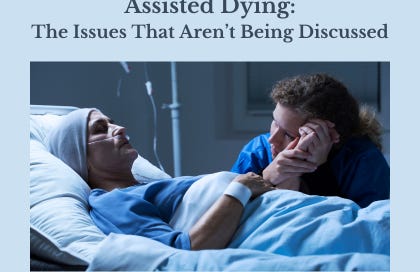


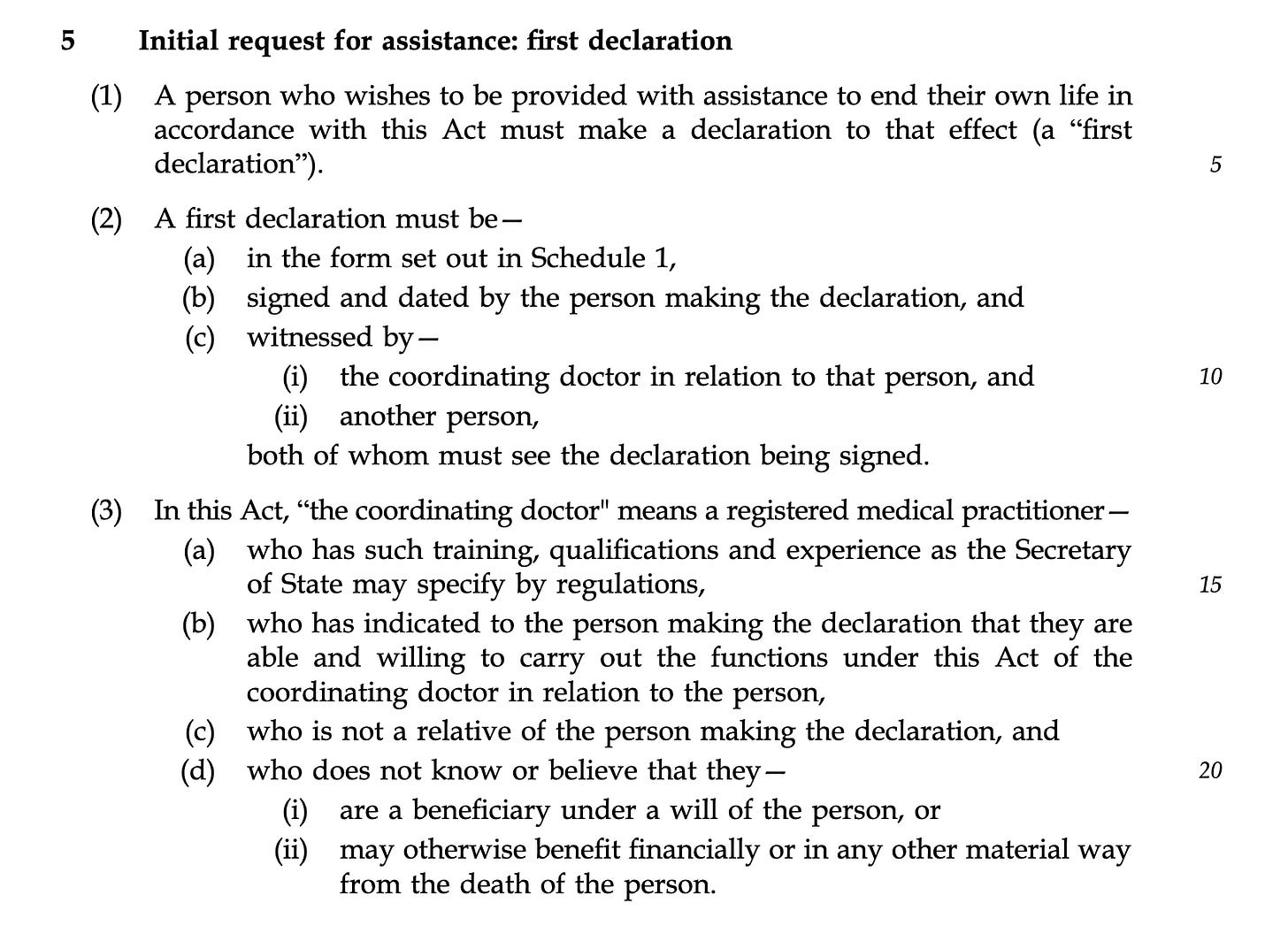
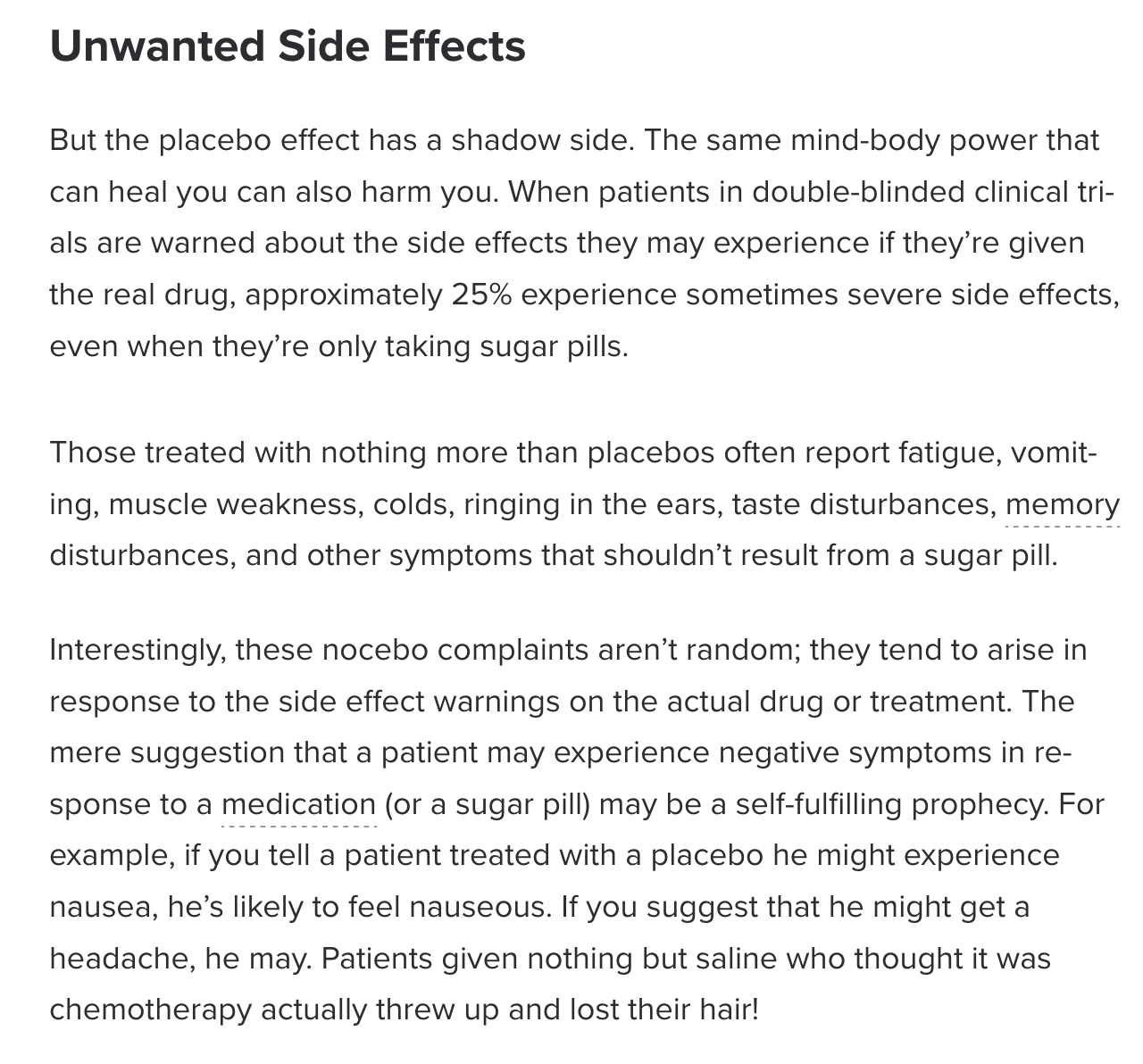
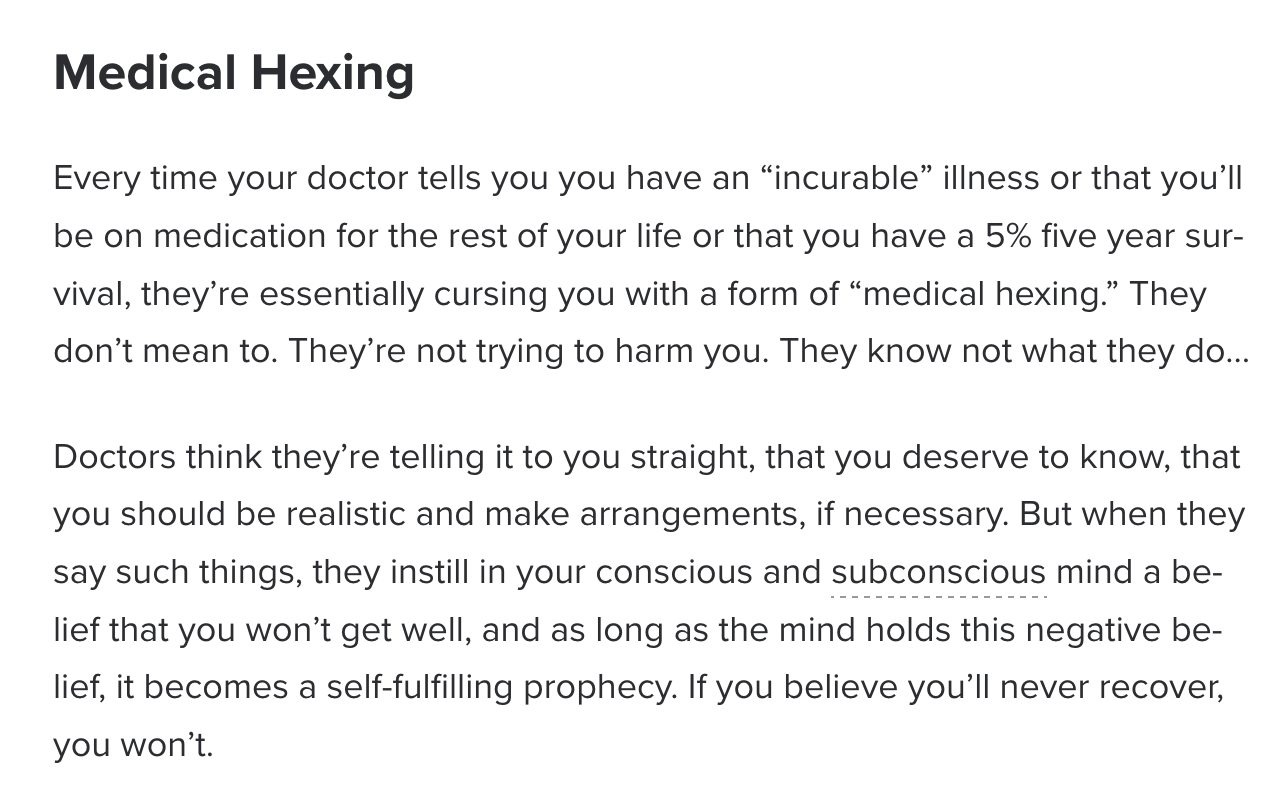
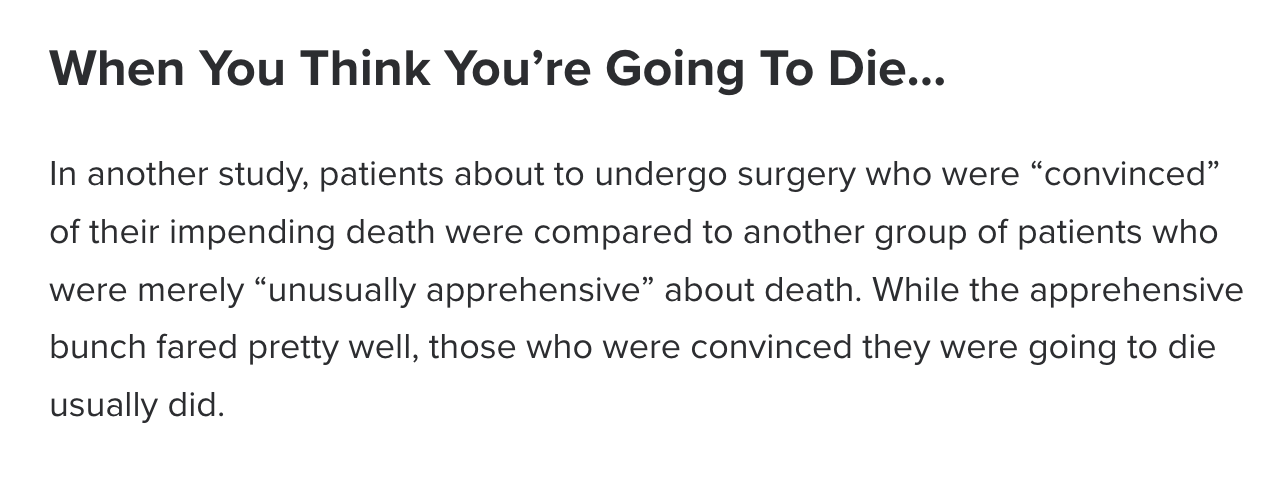
Thank you for bringing up the point that no doctor can predict how much time a patient has to live. I've always believed the only reason their predictions often end up being true is that their words to the patient are no more than a hex, which when believed and internalized by the sick person, become a self-fulfilling prophecy. It's a crime in my opinion.
Thank you. A great article.
Reminds me of the documentary Playing God .
Takeaways
-A group of special interest -do decide who lives and who dies.
-Medical staff get desensitised to what should not be practiced.
-There is no scientific way of choosing who is dying and if you try to do it you get it wrong.
euthanasia - by taking people that are not dying and putting them in a situation where they are sedated and drowsy and then they die , you kill someone without allowing them to get ready for death.
There is a process that you go through in the last few days of your life when you start to realise that you are dying , but that takes time, you go through a stage of anger, denial and then finally acceptance.
We need patients to be able to communicate, to face death in a natural way and not in a manufactured way.
—
Conservative woman had an article .
https://www.conservativewoman.co.uk/my-gratitude-to-my-husband-for-resisting-those-who-would-have-assisted-his-dying/
As for Progressive supranuclear palsy (PSP) . Another reclassified “diagnosis”.
A biological shock that affects on a deep level where you feel paralysed.
https://pmc.ncbi.nlm.nih.gov/articles/PMC2590314/
Progressive supranuclear palsy (PSP) was originally described in 1964. Although some contended it was merely a variant of Parkinson's disease,